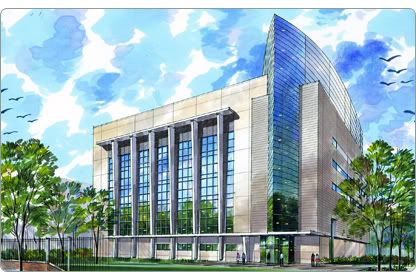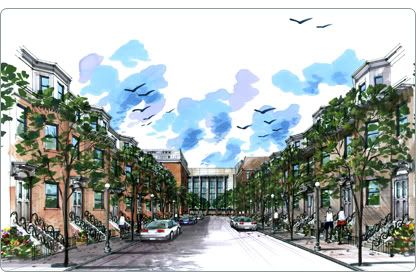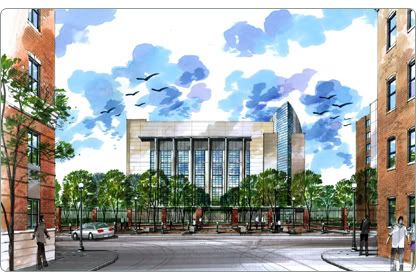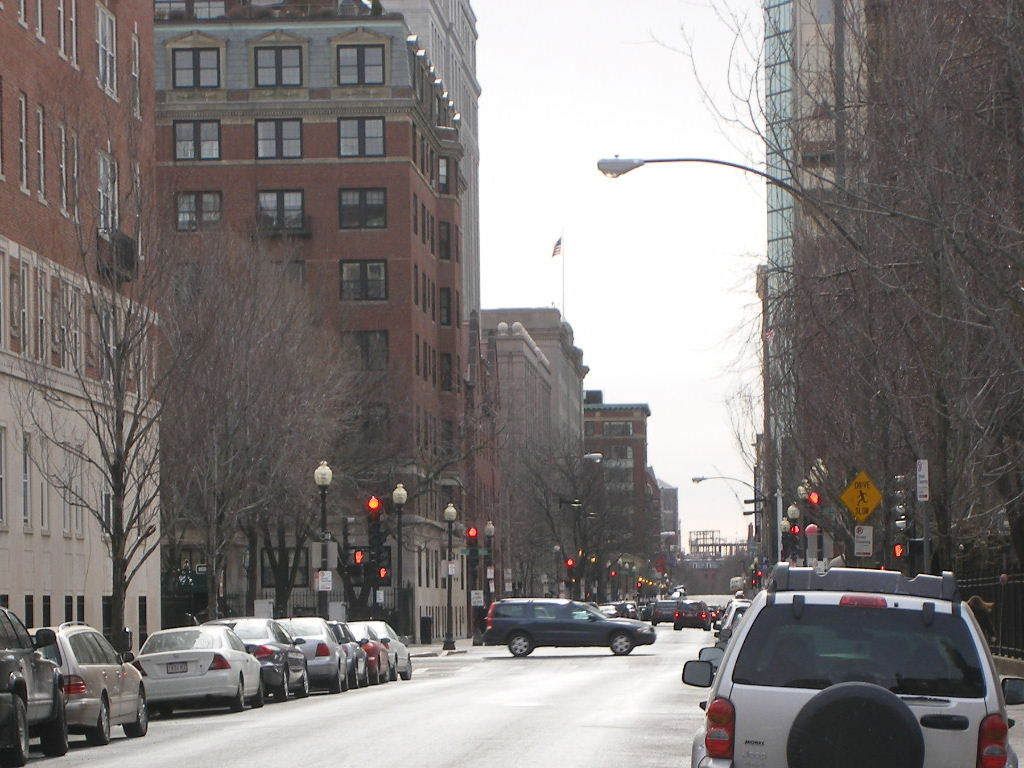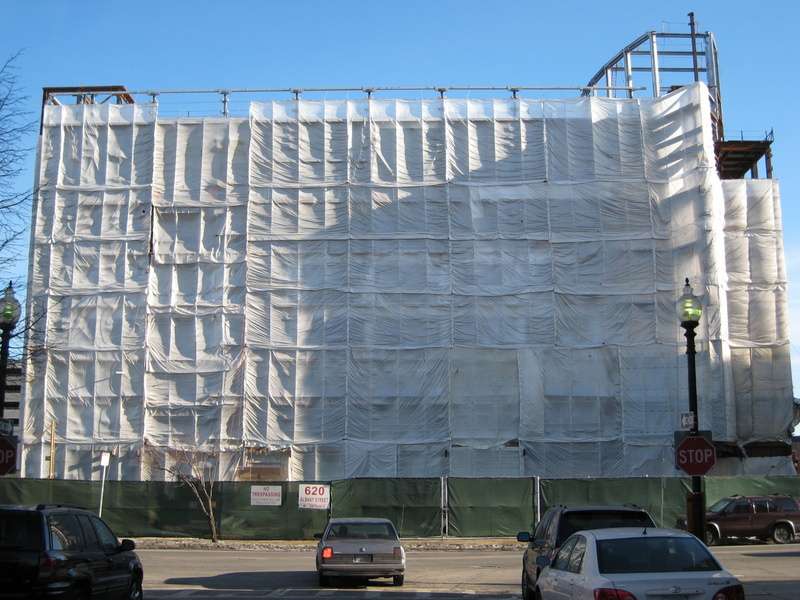Judge orders new review of BU biolab
Alternative sites must be weighed
By Stephen Smith, Globe Staff | August 4, 2006
A state judge has ordered further environmental review of a Boston University high-security laboratory where scientists will work with the world's deadliest germs, a decision that marks a potentially important victory for opponents of the controversial facility.
In a ruling made public yesterday, Suffolk Superior Court Judge Ralph D. Gants found that earlier assessments of the environmental impacts of the South End lab failed to adequately consider alternative sites or weigh worst-case scenarios for release of viruses or bacteria. Gants said the decision by the state Executive Office of Environmental Affairs to approve the lab ``was arbitrary and capricious" and ``lacked the necessary rational basis."
As a result, Gants demanded a new state environmental review. The decision does not explicitly halt construction of the $178 million Albany Street building, where work began earlier this year, but it does suspend some permits issued by the city and state.
``This decision should not be misunderstood to indicate that this court believes that the Biolab Project should not proceed, or that it may not safely be located in the . . . South End, or that it would be safer if located in a suburban or rural setting," Gants wrote in his 36-page ruling.
Still, the finding represents a triumph for neighborhood activists who for three years have fought the Biosafety Level-4 lab, a few blocks down from the Boston Medical Center.
Klare Allen , one of 10 residents from the South End and Roxbury who sued to halt the facility's construction, last night hailed Gants's ruling and predicted that it could prevent the lab project from becoming another tragedy like the Big Dig tunnel collapse.
``The judge is literally a savior," Allen said. ``With the Big Dig, everybody turned their back. Nobody wanted to deal with the issues that came up. Thank God the judge had the nerve to deal with this."
Ellen Berlin , a BU spokeswoman, said that the university intends to appeal the decision requiring a new review, and that construction is continuing on the lab, which is designed to let scientists hunt for drugs and vaccines against such diseases as Ebola, anthrax, and the plague. BU and the University of Texas Medical Branch at Galveston won the high-stakes competition to build two new Level-4 labs -- a cornerstone in the Bush administration's campaign to prepare for an act of bioterror.
The original environmental review process was ``reasonable, comprehensive, and complete," Berlin said. ``We believe this lab is important for public health."
The judge's ruling requires BU to file an updated environmental review and the Secretary of Environmental Affairs to consider it anew, but does not require the case to come back before the judge.
Representatives of the university as well as local, state, and federal agencies said their attorneys were analyzing the decision yesterday, so they could not comment extensively on it.
``At this point, we are still reviewing the court's decision on this matter and considering all of our options going forward," said Vanessa Gulati , spokeswoman for the Executive Office of Environmental Affairs.
The lab's design calls for extraordinary measures to ensure that lethal agents cannot escape or be removed. In existing Level-4 labs, armed guards monitor checkpoints, labyrinths of hallways make quick escape impossible, and scientists wear protective suits as they manipulate mechanical hands to work with deadly compounds.
The Boston facility, known officially as the National Emerging Infectious Diseases Laboratories, is being built with $128 million in federal money and $50 million contributed by BU, and will include lower-security labs in addition to the Level-4.
Despite safety assurances, the lab has provoked controversy since the moment it was proposed in January 2003, with a fervent contingent of scientists, environmentalists, and community activists protesting at every turn. After their objections failed to thwart approval by city, state, and local agencies, the opponents turned to the courts, suing at both the state and federal levels.
In the state suit, the opponents challenged the environmental review, meant to assure the lab would not pose a threat to the surrounding neighborhood.
In his decision, Gants, in considerable detail, portrays a lab with extraordinary opportunity to help science -- and the remote, but equally extraordinary, opportunity to harm the public.
It is, the judge writes, ``no ordinary project, and the potential risks it poses to the environment and public health are extraordinary and, potentially, catastrophic. . . . One prays that these risks are small, but in an imperfect world these risks inevitably exist, and they must be addressed."
Thus, Gants concludes, the project requires a robust environmental review.
The review, written by BU and approved by the state, was insufficient, Gants said. His ruling said the environmental report did not consider whether the lab could be built in a less congested area -- such as a suburban or rural community -- rather than the bustling urban neighborhood where BU's medical school is located. State environmental regulations mandate that alternative sites be weighed, but BU -- which said the site was appropriate because it was convenient to researchers who would work there -- did not consider spots outside the South End, the judge found.
Gants's other key concern was that the environmental review did not adequately evaluate a worst-case scenario for release of a deadly agent, a process required by state law. The BU review considered what would happen if anthrax spores escaped from the lab because of an equipment malfunction. But Gants said the environmental review should have also weighed the potential for pathogens to escape through a ``suicidal, criminal, or terrorist act." The judge said BU's pledges of exhaustive security checks of lab personnel were inadequate, noting that CIA and FBI agents subjected to similar reviews managed to perpetrate safety breaches.
Gants's order that certain permits for the lab be suspended left lawyers for both sides uncertain yesterday as to whether some aspects of the construction would have to be delayed or halted.
Douglas Wilkins , the attorney representing the 10 residents in the lawsuit, said he believes the permits could affect land use issues as well as sewers and waste water discharge.
Eloise P. Lawrence , an attorney for the Conservation Law Foundation , predicted in an interview that the ruling will stall construction, and that it will lead to more soul-searching about the lab. The foundation has sued separately in federal court to block the project on the grounds that it violates the civil rights of its low-income and minority neighbors.
This ruling ``makes it much more likely that meaningful review and greater introspection is going to occur, and that people are going to reconsider whether the lab makes sense for this location," Lawrence said. ``And that's exciting to me."
Stephen Smith can be reached at
stsmith@globe.com.
? Copyright 2006 Globe Newspaper Company.

